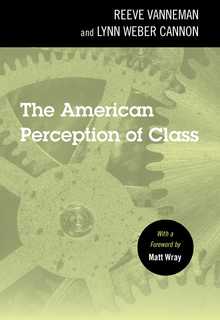The American Perception of Class
With a Foreword by Matt Wray
When The American Perception of Class was first published in 1987, scholars and nonacademics alike assumed that the American working class did not think of itself as a coherent class opposed to the dominant powers in American societyin short, that it is not class conscious. The American working class was perceived internationally as docile and complacent. It had never supported a strong socialist movement, a weak union movement had limited itself to simple wage demands, and class conflict had rarely threatened to explode into a social revolution. Both radicals and mainstream scholars explained this American exceptionalism by the conservative psychology of the American worker.
Reeve Vanneman and Lynn Weber Cannon presented a radically new interpretation of American class conflict and criticized earlier analyses for psychologizing the problem and "blaming the victims" for their subordination. The authors claimed that American workers were acutely conscious of class divisions, and they devoted most of the book to backing this up with empirical findings from a wide array of sources, drawing upon interviews and surveys with thousands of Americans.
Working against what was conventional wisdom proved to be difficult, and the book didn't change many minds when it was first published. But its reissue appears in a political and economic climate that clearly supports Vanneman and Cannon's conclusions. Debates about the economic fairness of the American economic system are a regular occurence. The divide between the haves and the have-nots, or the working class and the elites, has grown, exemplified by the Occupy movement and the successful appeal of Donald Trump to what was an angy working class fed up with what they saw as liberal elitism. Although there are gaps in the authors' analysis, notably the role of racism in shaping the working class, the book remains a model for challenging conventional wisdom using analysis and understanding of the dynamic power of institutions and collectives to shape historical change.
Table of Contents
Metadata
- publisherTemple University Press
- publisher placePhiladelphia, PA


